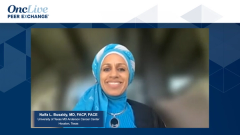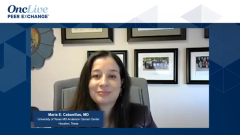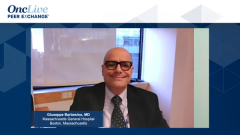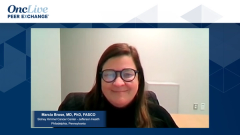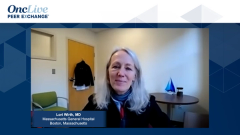
Thyroid Cancer Risk Factors
Naifa L. Busaidy, MD, FACP, FACE, comments on risk factors associated with the subtypes of thyroid cancers.
Episodes in this series

Lori Wirth, MD: Naifa, maybe you can talk a little about the changing incidence of thyroid cancer in the last 10 years or so, and then risk factors.
Naifa L. Busaidy, MD, FACP, FACE: Basically, the incidence of thyroid cancer, at least in the United States, had been rising for a long time. It was 1 of only 3 cancers that was rising, whereas most other cancers were stabilizing. In the last year or 2, that has also stabilized. Although the incidence was rising, it wasn’t just a matter of detecting or picking up smaller cancers because our technology got better. They found that there was an increased incidence of larger tumors. Nobody fully understands why that was happening. Thankfully the death rate has been fairly stable.
When we think about risk factors for thyroid cancer, the short of it is for differentiated thyroid cancer, which nobody fully understands. There are a few things we do know. Women are at higher risk, or there are more females with thyroid cancer. In general, differentiated thyroid cancer is not a hereditary disease. It doesn’t tend to be a familial cancer. There are some syndromes associated with thyroid cancer, like Cowden syndrome, Carney complex, and familial adenomatous polyposis. But that makes up a very small percentage. For familial papillary thyroid cancer, it’s extremely rare. We don’t even have a gene. Some epidemiological studies suggest chromosomes 19 and 1 are involved, but it tends not to be a hereditary disease.
Medullary thyroid cancer 20% of the time is familial, and there is a gene, the RET gene, that can be tested for. As far as other risk factors, about 10% of differentiated thyroid cancer—basically papillary thyroid cancer—is associated with radiation, especially in children who’ve had head and neck irradiation. It’s less of a factor in adults. But in 90% of people, we just don’t know what causes it.
People have looked at all sorts of epidemiological factors. One thing of note: we don’t encourage our patients to smoke, but smoking is associated with a lower incidence of papillary thyroid cancer. It didn’t tend to be significant in men, but it’s an interesting factor. Other than that, if 1 was near a nuclear fallout, there are some data about in the northeastern United States and different regions where there were nuclear plants or fallouts where increased risk or incidence existed.
With other factors, there’s diet. Some epidemiological studies suggest follicular thyroid cancer is increased in low-iodine areas and papillary thyroid cancer may be increased in high-iodine areas. Other than that, there aren’t many risk factors that patients can change or adjust.
Lori Wirth, MD: Can I ask a question? Why are women more at risk for developing thyroid cancer? What’s up with that?
Naifa L. Busaidy, MD, FACP, FACE: That’s a great question. Lots of researchers have looked at that. Is it estrogen? Is it something about estrogen that three-quarters of patients with thyroid cancer are women vs men? It’s not well understood. When we look at the more advanced cancers, those that need the systemic therapies, they tend to be 50/50. In general, men do worse than women, but it’s not clear why women get it more than men. People have looked at pregnancy and levels and postmenopause, and the rates don’t change, so it’s not an estrogen issue.
Lori Wirth, MD: Does anybody else have thoughts about why women are at higher risk for thyroid cancer?
Giuseppe Barbesino, MD: Thyroid cancer is not alone. All thyroid diseases are more common in women than in men. That includes thyroid nodules and benign thyroid nodules. It includes autoimmune thyroid disease. There’s something about the thyroid that is somehow more exposed in women. But we don’t have an answer to that either.
Lori Wirth, MD: That’s an interesting comment.
Transcript edited for clarity.


